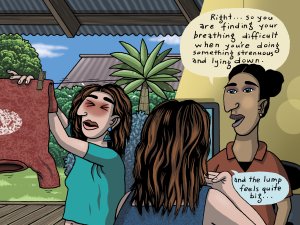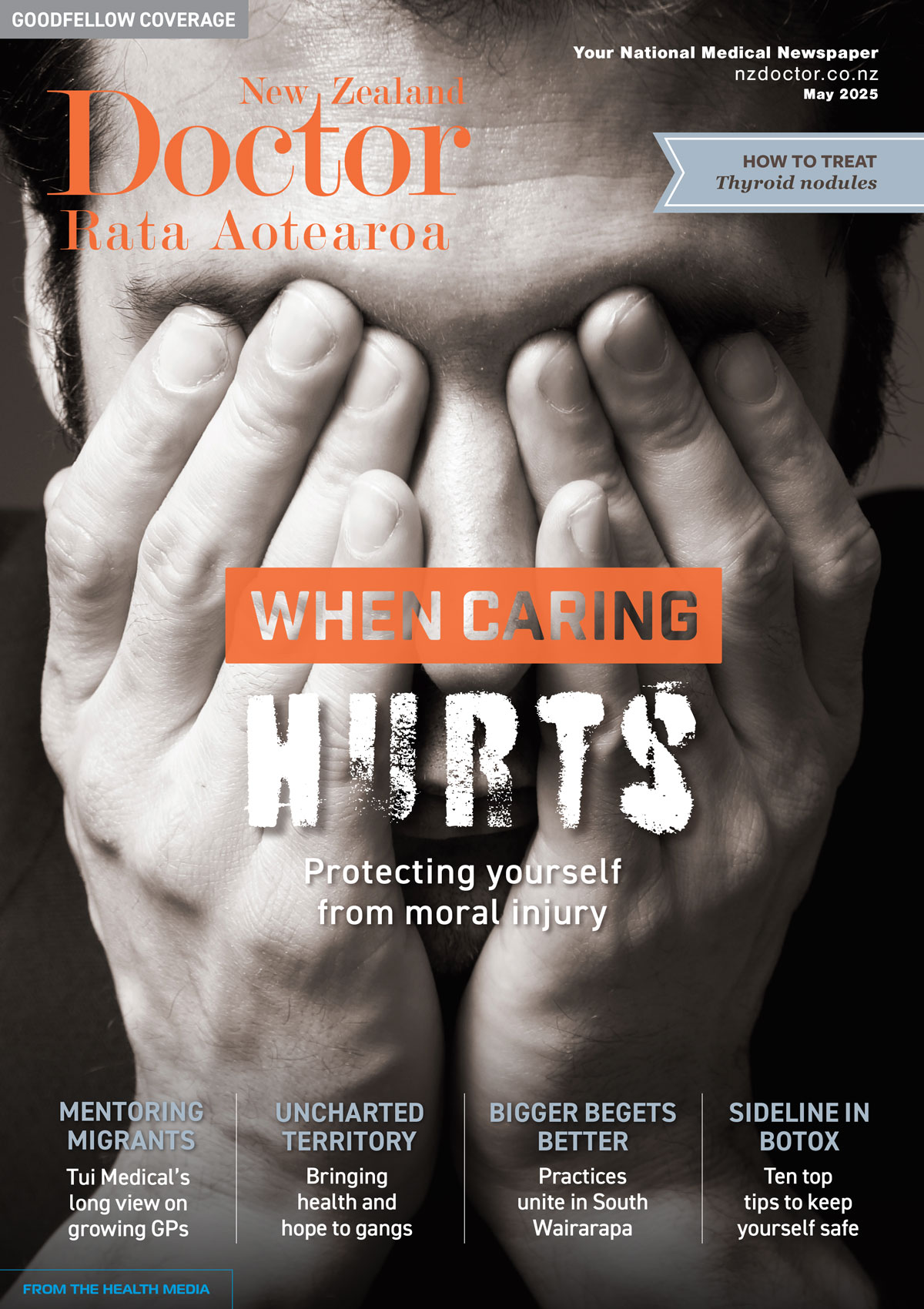Otolaryngologist, head and neck surgeon Francis T. Hall discusses the evaluation of thyroid nodules, which primarily aims to determine the likelihood of malignancy. He then reviews the treatment of thyroid nodules and thyroid cancer, including recent advances in management
Reframing ageing: Ageism is an insidious problem and it’s linked to bad health
Reframing ageing: Ageism is an insidious problem and it’s linked to bad health

We are on our summer break and the editorial office is closed until 17 January. In the meantime, please enjoy our Summer Hiatus series, an eclectic mix from our news and clinical archives and articles from The Conversation throughout the year. This article was first published in the 23 June edition
Professor Ngaire Kerse writes about how we think and talk about older people, and how it makes a difference to their wellbeing
- Ageism is associated with worse physical and mental health outcomes and high healthcare costs.
- Mechanisms by which ageism impacts on health include psychological, behavioural and physiological pathways.
- Interventions that combine education with intergenerational contact can change attitudes towards older people, knowledge about ageing and comfort with older people.
- The ageing population should be seen as an opportunity, rather than a burden.
This article has been endorsed by the RNZCGP and has been approved for up to 0.25 CME credits for the General Practice Educational Programme and continuing professional development purposes (1 credit per learning hour). To claim your credits, log in to your RNZCGP dashboard to record this activity in the CME component of your CPD programme.
Nurses may also find that reading this article and reflecting on their learning can count as a professional development activity with the Nursing Council of New Zealand (up to 0.25 PD hours).
Ageism is deeply embedded in our society and institutions, and we are products of that society and operate in its institutions. As “the doctor”, your words, attitudes and ways of working have an impact on the health and wellbeing of your older patients.
You may not think or see this, but qualitative and intervention research shows benefit to older people when they are given respect and feel listened to, and their behaviour changes because of GPs’ words and advice.
Similarly, negative words and attitudes can have a huge impact.
Our aim should be full inclusion and participation in society of our older patients, so let’s be part of the solution, not part of the problem.
FrameWorks Institute is an organisation that develops and disseminates useful toolkits to inform, raise awareness and provide resources to help people change. They give some simple suggestions about reframing our language about ageing (see table).
For GPs, nurses and nurse practitioners, it is easy to change words, but changing our thinking is harder. Here are a few areas to consider:
- Demographic change is an opportunity, rather than a burden. Emphasise the contributions that older people make to our lives, to each other’s lives and to the translation of wisdom through the generations.
- A comprehensive approach to ageing is needed, not just for health but for housing, transport, income support and local government – recognising that the non-medical determinants of wellbeing are as important as health, is critical to giving advice and pointing out opportunities.
- Allow older women and men to be self-advocates and let them speak on their own behalf. This pertains to difficult choices that they may wish to make themselves, and applies to strong family members (eg, spouses, daughters), other clinicians and neighbours.
During the COVID-19 pandemic, older people were labelled as vulnerable and dispensable overnight
Because ageism is bad for health.
During the COVID-19 pandemic, older people were labelled as vulnerable and dispensable overnight – a direct effect on mortality related to age was obviously associated with access to treatment.
The Australian Royal Commission into Aged Care Quality and Safety also outlines numerous issues and areas for improvement (tinyurl.com/AgedCareReport). Further, the ABC has nicely summarised issues of ageism that are broader than residential care (tinyurl.com/ABCageism).
Those people who feel discriminated against (high age discrimination on questionnaires) have worse diseases and incur more costs. Using population prevalence estimates, and adjusting for confounders, one study found that one year of ageism costs US$63 billion, or one of every seven dollars spent on eight common chronic diseases.1
Potentially, those subjected to discrimination don’t value themselves, don’t look after their health and are denied opportunities (sounds familiar!). Impacts on loneliness, social isolation and even cognition have been associated with ageism against older people.
A systematic review published last year found the simultaneous impact of structural ageism, where institutions reinforce systematic bias against older people, and individual ageism, where older people assimilate negative views of ageing from their culture, results in worse health outcomes all around the world and across age groups, and has greater negative impact on people otherwise economically and educationally disadvantaged.2
This review reported on 50 studies about physical illness and 42 studies about mental illness where ageism was associated with worse outcomes. On a brighter note, when older people resisted negative age stereotypes, they were less likely to experience suicidal ideation, post-traumatic stress disorder and anxiety.2
Mechanisms by which ageism impacts on health include psychological (low self-efficacy, less perceived control, lack of purpose in life, greater intention to leave work), behavioural (less physical activity, less career-advancing activities) and physiological (C-reactive protein partially mediates the relationship between positive self-perceptions of ageing and longevity) pathways.2
There are examples of successful interventions that changed attitudes towards older people, knowledge about ageing and comfort with older people.
Combined interventions with education and intergenerational contact worked the best, and the most impacted were women, and adolescent and young adult groups. However, no significant effects on anxiety about one’s own ageing or interest in working with older adults were found.3
Whether health outcomes for older people were improved was not studied – this would be hard to study as the impacts of ageism are likely to be accrued over a lifetime.3
So, I invite you to the bandwagon of anti-ageism, to think about older people positively, to act positively and encourage full participation in society for your older patients. Their health will benefit, and your job will be easier as a result.
Ngaire Kerse is a professor of general practice and primary health care, and the Joyce Cook Chair in Ageing Well, University of Auckland
You can use the Capture button below to record your time spent reading and your answers to the following learning reflection questions:
- Why did you choose this activity (how does it relate to your PDP learning goals)?
- What did you learn?
- How will you implement the new learning into your daily practice?
- Does this learning lead to any further activities that you could undertake (audit activities, peer discussions, etc)?
We're publishing this article as a FREE READ so it is FREE to read and EASY to share more widely. Please support us and our journalism – subscribe here
- Levy BR, Slade MD, Chang ES, et al. Ageism amplifies cost and prevalence of health conditions. Gerontologist 2020;60(1):174–81.
- Chang ES, Kannoth S, Levy S, et al. Global reach of ageism on older persons' health: A systematic review. PLoS One 2020;15(1):e0220857.
- Burnes D, Sheppard C, Henderson CR Jr, et al. Interventions to reduce ageism against older adults: A systematic review and meta-analysis. Am J Public Health 2019;109(8):e1–9.





![New Zealand Doctor Rata Aotearoa editor Barbara Fountain, RNZCGP president elect and Tauranga-based specialist GP Luke Bradford, Ministry of Health clinical chief advisor rural health Helen MacGregor, and Health New Zealand Te Whatu Ora clinical director primary and community care Sarah Clarke [Image: NZD]](/sites/default/files/styles/thumbnail_cropped_100/public/2025-05/1.%20Barbara%20Fountain%2C%20Luke%20Bradford%2C%20Helen%20MacGregor%20and%20Sarah%20Clarke.jpg?itok=091NETXI)
![Ngāti Porou Oranga specialist GP Elina Pekansaari and Te Nikau Hospital specialist in general practice and rural hospital medicine David Short [Image: NZD]](/sites/default/files/styles/thumbnail_cropped_100/public/2025-05/2.%20Elina%20Pekansaari%20and%20David%20Short.jpg?itok=h5XfSBVM)
![Locum specialist GP Margriet Dijkstra and OmniHealth regional operations manager (southern) Patricia Morais-Ross [Image: NZD]](/sites/default/files/styles/thumbnail_cropped_100/public/2025-05/3.%20Margriet%20Dijkstra%20and%20Patricia%20Morais-Ross.jpg?itok=jkrtRfJC)
![Golden Bay dairy farmer and dairy industry health and safety doctoral student Deborah Rhodes, and Golden Bay Community Health specialist GP Rachael Cowie [Image: NZD]](/sites/default/files/styles/thumbnail_cropped_100/public/2025-05/4.%20Deborah%20Rhodes%20and%20Rachael%20Cowie.jpg?itok=oM0_GcJc)
![Hauora Taiwhenua clinical director rural health Jeremy Webber, Australian College of Rural and Remote Medicine president Rod Martin and Observa Care director of business operations Deborah Martin, the wife of Dr Martin [Image: NZD]](/sites/default/files/styles/thumbnail_cropped_100/public/2025-05/5.%20Jeremy%20Webber%2C%20Rod%20Martin%20and%20Deborah%20Martin%2C%20the%20wife%20of%20Dr%20Martin.jpg?itok=P_aGmX_H)
![Spark Health chief executive John Macaskill-Smith and client director Bryan Bunz [Image: NZD]](/sites/default/files/styles/thumbnail_cropped_100/public/2025-05/6.%20John%20Macaskill-Smith%20and%20Bryan%20Bunz.jpg?itok=5yJvVZ0I)
![Associate dean (rural) Kyle Eggleton, third-year medical student Roselle Winter, and second-year pharmacy student Alina Khanal, all from the University of Auckland [Image: NZD]](/sites/default/files/styles/thumbnail_cropped_100/public/2025-05/7.%20Kyle%20Eggleton%2C%20Roselle%20Winter%20and%20Alina%20Khanal.jpg?itok=RQLd3TEs)
![Health New Zealand Te Whatu Ora clinical editor and specialist in general practice and rural hospital medicine Anu Shinnamon, and Whakarongorau chief clinical officer Ruth Large [Image: NZD]](/sites/default/files/styles/thumbnail_cropped_100/public/2025-05/8.%20Anu%20Shinnamon%20and%20Ruth%20Large.jpg?itok=i5TMswY9)
![Te Kahu Hauora Practice specialist GP Jane Laver and Ngāti Kahungunu ki Tāmaki-nui-a-Rua chief operations manager Tania Chamberlain [Image: NZD]](/sites/default/files/styles/thumbnail_cropped_100/public/2025-05/9.%20Jane%20Laver%20and%20Tania%20Chamberlain.jpg?itok=jtMklaCZ)